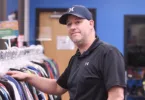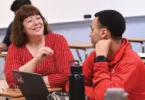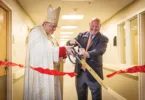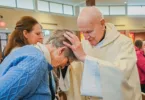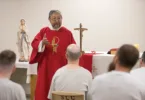
by Joe Bollig
joe.bollig@theleaven.org
KANSAS CITY, Kan. — Father Dan Gardner was like everyone else last March: locked down, frustrated and wondering what would happen next.
“When the announcement came out to shut everything down, I just walked around the house for a couple of days, and I was ready to climb the walls,” said Father Gardner, pastor of St. Ann Parish in Hiawatha and St. Leo Parish in Horton.
One year ago this month, “normal life” went away when the national COVID-19 response began in earnest.
A national lockdown began on March 16 as part of “fifteen days to slow the spread.” And between March 12 and 19, every diocese in the country prohibited the celebration of public Masses. Parish life largely went dormant.
Things didn’t stay that way. Soon, pastors all over the archdiocese began to rally their pastoral staff and parish volunteers to provide the sacraments, operate parish ministries and engage parishioners.
On this first anniversary of what many consider the “beginning” of the pandemic in the United States, The Leaven asked some veteran pastors to reflect on the past 12 months.
Facing challenges
The top challenges all pastors faced could be placed into two categories, according to Msgr. Thomas Tank, pastor of Ascension Parish in Overland Park. The first was maintaining contact with parishioners and keeping them engaged. The second was finding ways to provide the sacraments.
It wasn’t easy to do with all the churches closed.
“I had a real difficulty closing the church, which was the decision of the priests of Johnson County,” said Msgr. Tank. “We could still have Mass, but the church was locked. That was terrifically painful, and I’ll never do it again.”

Each pastor said they were challenged by the loss of the personal contact that normally occurred in the context of the Mass and parish social events.
They missed their parishioners, and their parishioners missed them.
“The hardest thing was not seeing people before or following Mass to be able to talk with them and see how their personal lives were going,” said Father Bill Porter, pastor of St. Agnes Parish in Roeland Park.
“We tried regular mail, phone and email, but it’s been an effort,” he continued.
“I just missed being with the people,” said Father Gardner. “I don’t mind being by myself, but I don’t like it for a large amount of time. Life certainly slowed down for a while.”

Father Gardner had the unhappy experience of being called to a nursing home to anoint a resident. At the door, he was given a quick test and was told he was infected with the COVID-19 virus. It was just before Christmas, so he was forced to quarantine and had to ask the Benedictines to cover his Masses. Later, a more thorough test showed he wasn’t sick at all.
Adapting and adjusting
Pastors became creative to maintain contact with parishioners and to provide the sacraments, and technology played a big role. Some pastors were more conversant with social media platforms than others.
“As they said at the evangelization convocation [in 2019], ‘become comfortable with the uncomfortable,’” said Father Gardner. “[I learned] how to use media to connect with people.”
Father Gardner learned how to use the Facebook social media platform and livestreamed daily Mass from his dining room, it being the place with the best connection. He also learned, quite by accident, about filters when he celebrated Mass with a “Blues Brothers” filter that put him in a hat and sunglasses.
Msgr. Michael Mullen, ordained for 58 years, began to use the internet for his ministry for the first time.
“For me, I wouldn’t be on livestream every day had this not happened,” said Msgr. Mullen, senior associate pastor in residence at St. Joseph Parish in Shawnee. He began a 12:30 p.m. daily teaching program called “Holy Dessert.” That, and daily rosaries, will continue as his outreach to elderly and homebound parishioners during post-pandemic times.

Father Porter’s experience in campus ministry and at new parishes helped him adapt.
“Being in campus ministry for 16 years, you learn you don’t need a lot of things to have church,” he said. “If you have the essentials, you can say Mass anywhere, and you can hear confessions sitting in your car seat or under an awning. You can do things differently than you’ve ever done before.
“One of the nice things about this is how appreciative people have been that ministry continues in the midst of [the pandemic]. You’re trying to keep them safe and reach them as best you can, offering Mass even on a limited basis.”
The things they learned
The veteran pastors learned a lot of things that inspired and informed them during the pandemic.
“The faith-filled goodness of parishioners is one of those,” said Msgr. Tank. “They have a desire to really share in the life of the church, attend Mass and receive the sacraments. Another was the value of social communication, whether it’s livestreaming or telephone contacts. [Also], the fragility of the whole system — society and the church.”
Msgr. Mullen observed that God is with the church now as much as ever.
“God is still in charge,” he said. “None of this is happening without his awareness. It’s fully a part of his plan as anything else.”
The best response of priests is to remain faithful in prayer, he said.
“I think the top thing [I learned] is that people long and hunger for community, to be with other people,” said Father Porter. “We’re not wired to be in isolation and separated from each other.”
A big unknown right now is what things are going to look like in the post-pandemic period. People are all over the spectrum regarding how they feel about COVID-19, said Msgr. Tank. Some are still very anxious, while others feel that even the basic safety precautions are not needed. The challenge will be how to minister to them all.
But there is one thing that all the pastors are encouraged by: More people are coming back to regular Sunday worship.
“It’s good to see the church filling back up,” said Msgr. Tank. “It’s great to see families with young children, as well as the older people. It really is a joy.”

